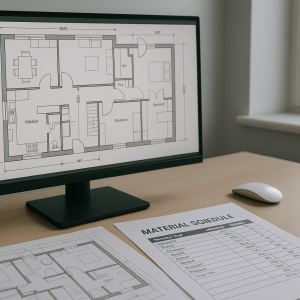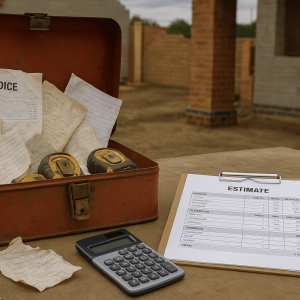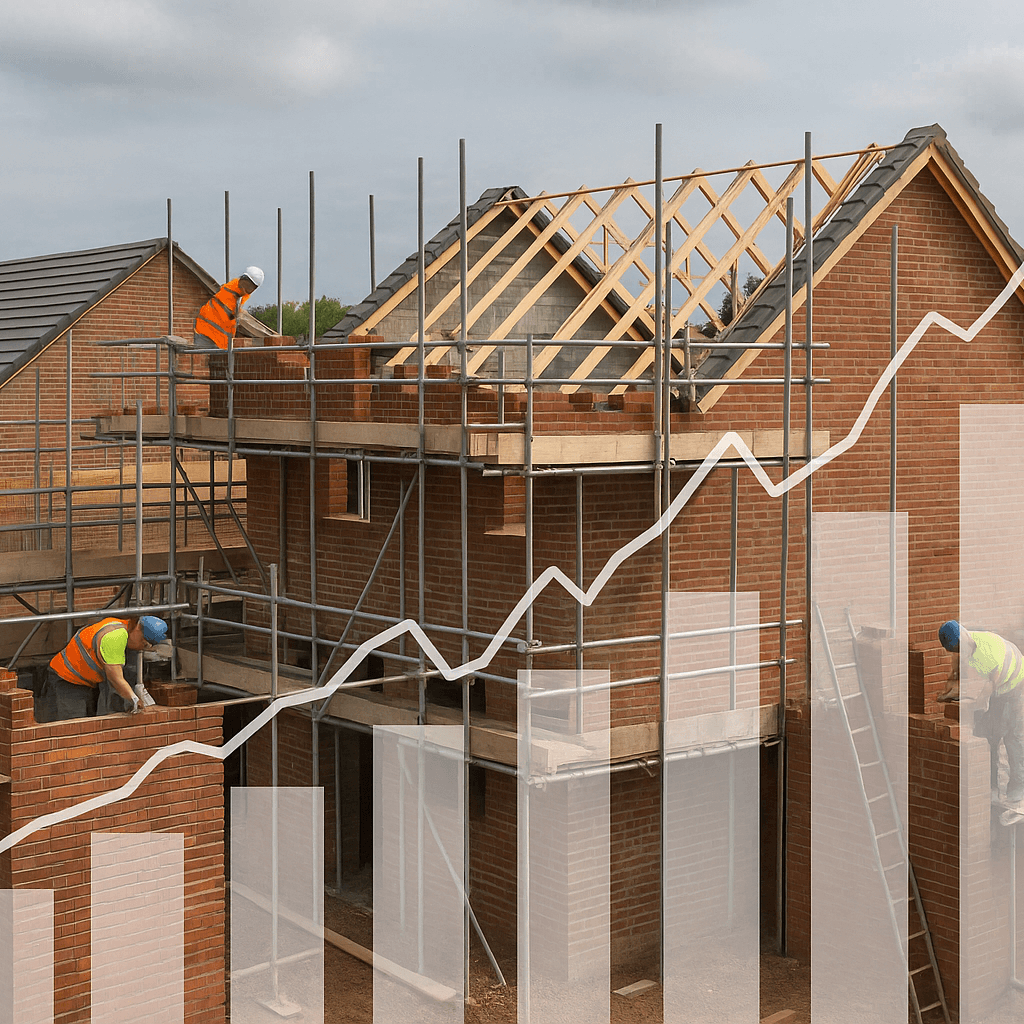The cost of a construction project can be a major concern for builders and potential homeowners. Understanding the factors that influence these costs is crucial for effective planning and budgeting. In this article, we will explore the basics of construction cost estimation and discuss the key factors that can impact the overall cost of your build estimate. Whether you are embarking on a small residential project or a large commercial development, having a clear understanding of the cost implications is essential for a successful outcome.
Understanding the Basics of Construction Cost Estimation
A construction cost to build estimator plays a vital role in the building industry. They are responsible for assessing project plans, determining the quantity of materials required, and estimating the labor and equipment costs involved. Their expertise helps builders and clients make informed decisions and ensures that projects stay within budgetary constraints.
In the UK construction industry, the services of a qualified estimator can prove invaluable. Their knowledge of local regulations, market trends, and construction practices enables them to provide accurate and reliable estimates tailored to specific projects.
When it comes to construction cost estimation, there are several key factors that need to be considered. These factors can significantly impact the overall cost of a construction project and understanding them is crucial for accurate estimation.
The Role of a Cost Estimator
A construction cost estimator is skilled in analysing project specifications, blueprints, and other relevant documents. They use this information to compile an itemized list of materials, labor, and equipment needed to complete the project. By considering factors such as building codes, project location, and labor rates, estimators can provide builders with a realistic estimate of the costs involved.
Estimators also take into account the complexity and size of the project. A larger and more complex project will require more materials, labor, and equipment, which will ultimately impact the overall cost. They also consider the location of the project, as construction costs can vary depending on the region. For example, construction costs in urban areas may be higher due to factors such as higher labor costs and limited space for equipment.
Labour costs are another important factor to consider. Estimators need to take into account the wages of different types of workers, such as carpenters, electricians, and plumbers. Labor rates can vary depending on the region and the demand for skilled workers in the construction industry.
Material costs also play a significant role in construction cost estimation. Estimators need to consider the prices of various materials, such as concrete, steel, and lumber. These prices can fluctuate due to factors such as supply and demand, market conditions, and transportation costs.
Equipment costs are another factor that needs to be taken into account. Estimators need to consider the cost of renting or purchasing equipment, such as cranes, excavators, and scaffolding. The duration of the project and the specific equipment requirements will influence the overall equipment costs.
Overhead costs, such as insurance, permits, and administrative expenses, also need to be factored into the construction cost estimation. These costs are necessary for the smooth operation of the project and need to be included in the overall budget.
Key Factors Influencing Construction Costs
Several factors can significantly impact the cost of a construction project. Understanding these factors is crucial for accurate cost estimation. Some key factors include:
- Project size and complexity: Larger and more complex projects require more materials, labour, and equipment, which can increase the overall cost.
- Location: Construction costs can vary depending on the region. Factors such as labor rates, availability of materials, and local regulations can influence the cost.
- Labour costs: The wages of different types of workers, as well as the demand for skilled labor, can impact the overall cost.
- Material costs: The prices of various materials, such as concrete, steel, and lumber, can fluctuate and affect the overall cost.
- Equipment costs: The cost of renting or purchasing equipment needed for the project can add to the overall cost.
- Overhead costs: Expenses such as insurance, permits, and administrative costs need to be factored into the budget.
Breaking Down the Elements of a Build Estimate
When it comes to estimating the cost of a construction project, there are several key elements that need to be considered. These elements include labour costs, material costs, equipment costs, and overhead costs. By understanding and analysing each of these components, estimators can provide an accurate and comprehensive build estimate.
Labour Costs
Labour costs are a significant component of any cost to build estimator. Skilled tradespeople, such as carpenters, electricians, and plumbers, contribute their expertise to the construction process. Estimators consider factors such as labor rates, project duration, and the number of workers required to complete the project to calculate labor costs accurately.
For example, if a project requires extensive electrical work, the estimator will need to account for the number of electricians needed, their hourly rates, and the estimated time it will take to complete the electrical installations. By considering these factors, the estimator can provide an accurate labor cost estimate.
Material Costs
Materials form the building blocks of any construction project. Estimators analyze project plans and specifications to determine the quantity and quality of materials needed. They factor in market prices, availability, and any specific requirements to provide an accurate estimation of material costs.
For instance, if a project involves constructing a new building, the estimator will need to calculate the amount of concrete, steel, and other materials required based on the architectural plans. They will also consider factors such as the current market prices for these materials and any additional costs associated with sourcing specialized materials. By carefully analyzing these factors, the estimator can provide an accurate estimate for material costs.
Equipment Costs
Construction projects often require the use of specialised equipment and machinery. These costs can vary significantly depending on the project’s scope and duration. Estimators consider the rental or purchase costs of equipment and include them in the build estimate accordingly.
For example, if a project involves excavation work, the estimator will need to factor in the cost of renting or purchasing excavators, bulldozers, and other necessary equipment. They will also consider the duration of equipment usage and any additional costs such as fuel and maintenance. By accurately accounting for equipment costs, the estimator can provide a comprehensive build estimate.
Overhead Costs
Overhead costs encompass various expenses not directly related to labor or materials but still essential for the completion of the project. These costs may include insurance, permits, utilities, and administrative expenses. Accurately accounting for overhead costs ensures a comprehensive build estimate.
For instance, the estimator will need to consider the cost of obtaining necessary permits and licenses for the construction project. They will also factor in the cost of insurance coverage, such as liability insurance, to protect against any potential risks or accidents. Additionally, the estimator will include administrative expenses such as office rent, software, and other overhead costs that are essential for managing the project. By carefully considering these overhead costs, the estimator can provide a more accurate build estimate.
In conclusion, estimating the cost of a construction project involves analyzing various elements such as labor costs, material costs, equipment costs, and overhead costs. By carefully considering each of these components, estimators can provide an accurate and comprehensive build estimate that takes into account all the necessary expenses for the successful completion of the project.
The Impact of Project Size and Complexity on Cost
How Size Affects Your Estimate
It goes without saying that larger construction projects tend to have higher costs. The amount of labor, materials, and equipment required increases with the size of the project. Estimators carefully evaluate project plans and use historical data to anticipate the scale of resources needed for a build of a particular size.
The Role of Project Complexity
Complexity can significantly impact construction costs. Projects with intricate design elements, architectural nuances, or unique technical requirements often require additional expertise and resources. Estimators take into account the complexity of the project when calculating their estimates to ensure no unexpected costs arise during construction.
The Influence of Location on Construction Costs
Cost Differences by Region
Construction costs can vary significantly across different regions in the UK. Factors like the local economy, availability of materials, and labor rates contribute to these differences. Estimators familiar with specific regions can accurately assess the cost implications associated with building in different areas.
Urban vs. Rural Construction Costs
Urban and rural settings also bring their unique challenges and costs. Building in urban areas may involve higher land prices, stricter regulations, and limited accessibility. Estimators consider these factors when preparing estimates to ensure that builders are aware of the additional costs associated with different locations.
How to Prepare for Unexpected Costs
Contingency Funds for Construction
Even with careful planning and estimation, unexpected costs can arise during construction. To mitigate the impact of these unforeseen expenses, it is essential to set aside contingency funds. Estimators often include a contingency percentage in their estimates to provide a safety net for builders.
Dealing with Cost Overruns
In the event that actual costs exceed the initial estimate, it is crucial to address cost overruns promptly. Builders should work closely with their estimators to identify the reasons for the overruns and develop strategies to get the project back on track. Regular communication and ongoing cost analysis are key to managing and minimizing cost overruns.
In conclusion, understanding the factors that influence construction costs and the importance of accurate estimates is vital for builders and potential homeowners. By working with experienced construction estimators, builders can ensure that their projects are well-planned, within budget, and completed to the highest standards. Embracing the benefits of estimating services can greatly enhance the success and profitability of construction ventures in the UK.
Ready to take the next step towards a successful construction project? At Cost Estimator, we specialize in providing detailed and accurate build estimates tailored to the UK market. Our team of expert estimators is equipped with the latest cost estimating practices, tools, and methodologies to ensure your project stays on budget and on schedule. From residential renovations to large-scale commercial developments, we understand the intricacies of the UK building sector and are here to support your venture. Don’t leave your budget to chance; upload your plans today and receive a comprehensive estimate that sets the foundation for your project’s success.











